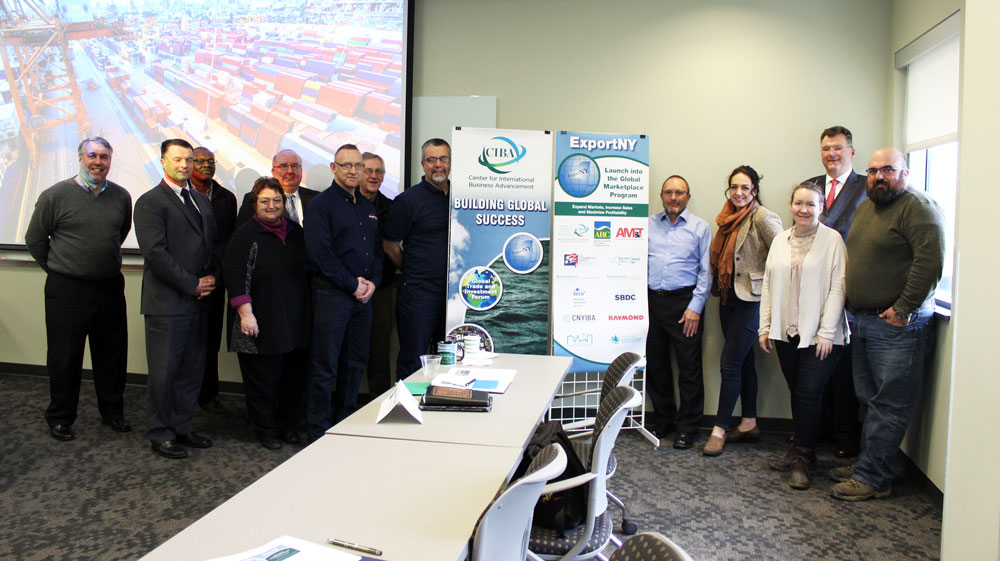Program highlights benefits of exporting for Southern Tier businesses
The ExportNY "Launch into the Global Marketplace" program gives an overview of exporting

Lack of knowledge is one of the biggest barriers preventing small and medium-sized businesses from exporting their products to international markets as a way of increasing sales and growth potential. Many don’t realize that advancements in technology and communications have made it possible to get in on the action.
A new program at Binghamton University helps break down this barrier by providing Southern Tier companies the knowledge and resources needed to export their goods and services.
The six-month ExportNY “Launch into the Global Marketplace” program is offered by the Center for International Business Advancement (CIBA) in partnership with the Alliance for Manufacturing & Technology (AM&T), the Global New York Program of Empire State Development, the U.S. Commercial Service and the Small Business Administration.
The program began in February 2018 and is facilitated by Elena Iankova, founding director of CIBA and an adjunct assistant professor in Binghamton’s School of Management. Iankova, with a grant from the Appalachian Regional Commission (ARC), modeled this program on a similar ExportNY program that has been run at Syracuse University for nearly 20 years.
She says the goal of the program is to help foster economic growth and job creation in the Southern Tier of New York state as a result of increased exporting. Three companies are taking part in the first iteration of the program: CMP Advanced Mechanical Solutions from Binghamton, Awestruck Ciders from Sidney and Cascun Farm from Greene.
“Exporting seemed like a taboo thing to a small business like us,” says Andrea Cascun, one of the owners of Cascun Farm. “I always thought you had to be this big, gigantic corporation to export your products. But we’ve learned that even we can export.”
Cascun says that what sparked her interest in exporting was a desire to not waste the leftover products from the company’s meat-processing operations.
“We’d like to be using every part of the animal for something, which isn’t possible in just the United States,” she says. “There’s a whole world out there that could use our leftover products that I didn’t even know existed. It’s overwhelming and exciting at the same time.”
The program’s curriculum covers numerous topics, providing a complete and comprehensive overview of what is involved in exporting. Getting participants up to speed on what they need to know are faculty from the School of Management as well as experts and guest speakers from all areas of business and international trade.
“We’ve gotten so much information from this,” says William Hoover, product realization manager at CMP Advanced Mechanical Solutions. “And we’ll take this information back to our company and it’ll help us make better decisions when it comes to these opportunities.”
“There is a huge spectrum of knowledge needed, and having access to that is invaluable,” says Patti Wilcox, co-founder of Awestruck Ciders.
Awestruck Ciders produces hard ciders made from New York state apples. By targeting the South Africa market, Wilcox believes exporting could open up new opportunities.
“We think it’s important to the local economy to expand our view of the market on a global scale,” she says. “We’re fascinated by this idea of an international cultural exchange, and we think doing so commercially is very valuable.”
Supporting the companies are teams of students from Binghamton’s School of Management. Students from Iankova’s global business risk management class are assigned to specific international markets that the companies are targeting. After an initial presentation from the participating companies, students then conduct research and present recommendations throughout the course of the semester.
“It’s a two-way street,” Iankova says. “The students provide the companies their findings and research, and the companies provide the students real-life experiential learning opportunities, helping them develop their management research and consulting skills.”
The four-month educational portion of the program culminates with an executable export plan that the companies create, based on what they’ve learned. Following that is the implementation phase, a two-month period in which participants coordinate and collaborate with key partners such as Empire State Development’s Global NY Program and the U.S. Commercial Service to establish direct links with their target foreign markets.
AM&T will continue to track the impact the program has made on participants and the region after the program has ended. The overall goal is not only to raise awareness of exporting opportunities in the Southern Tier, but to encourage economic growth and profitability by the potential job growth and increased investments than can happen as a result.
“According to the U.S. Chamber of Commerce, markets outside the U.S. represent 80 percent of world’s purchasing power, 92 percent of economic growth and 95 percent of consumers. And they continue to grow fast,” says Iankova. “Exporting can be profitable for businesses of all sizes. Sales grow faster, more jobs are created and employees earn more than in non-exporting firms. Research shows that jobs in export-intensive industries pay on average 18 percent more.”
The program will next take place in fall 2018. Companies interested in participating need to enroll by August 1.
Visit the program website at the link for more information, or contact Iankova at eiankova@binghamton.edu.

